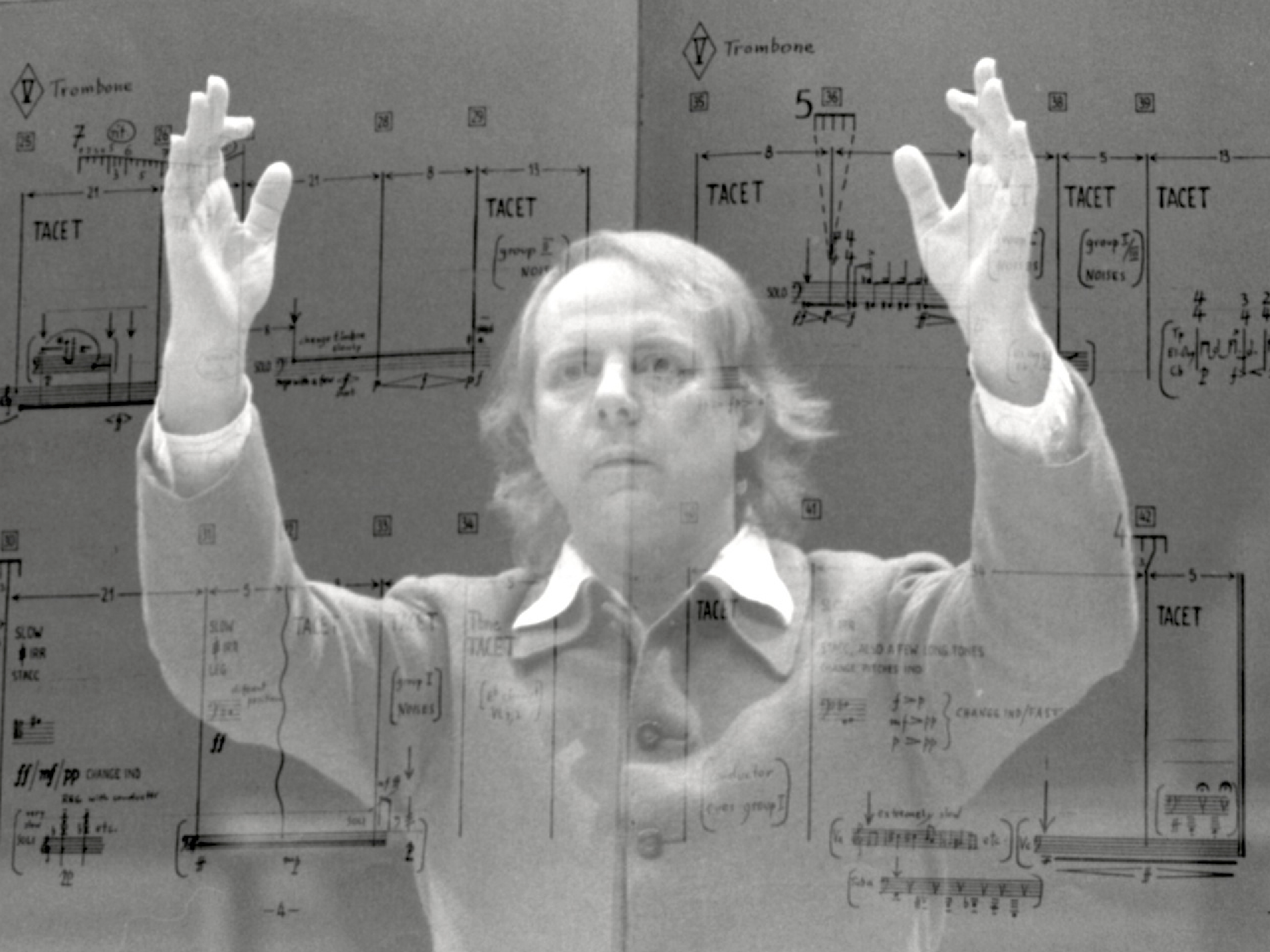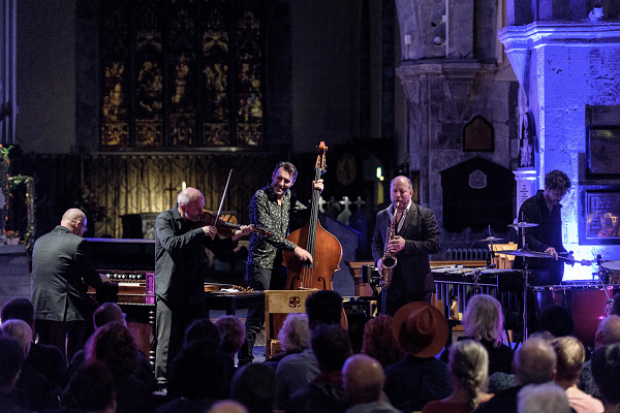
Difficult Listening Hour
‘Good evening. Welcome to Difficult Listening Hour. The spot on your dial for that relentless and impenetrable sound of Difficult Music. So sit bolt upright in that straight-backed chair, button that top button, and get set.’ — Laurie Anderson, Difficult Listening Hour
Ever since my mid-teens I’ve had a taste for what can loosely, if inadequately, be called ‘difficult music’. This is not a musical style but, perhaps, an attitude of mind. It includes the sort of music that my Auntie Madge used to describe as ‘that horrible plink-plonk stuff’. It includes the sort of music that I imagine the conductor Sir Thomas Beecham had in mind when he said, ‘I’ve never heard any Stockhausen, but I have trodden in some.’
The kind of music I mean goes by various names: modern music, contemporary music, avant-garde music, new music, experimental music. None these terms is exactly synonymous with any of the others, but all are fumbling attempts to describe what is, broadly speaking, the same thing: a kind of music that owes more to Western classical tradition than to traditional, popular or vernacular sources; is usually fully notated; is complex, dissonant and will often not contain any hummable melody or danceable rhythm; is hard to play and difficult to remember exactly. It is the kind of music written by composers like Edgard Varèse, Olivier Messiaen, György Ligeti, Iannis Xenakis, Karlheinz Stockhausen, James Tenney, Horatiu Radulescu, Claude Vivier, Kaija Saariaho and many, many others. I love all sorts of other music too, but it is this ‘difficult music’ (the quotation marks are ironic) that is finally the music I care about most, the music I’ve tried to make my life around, listening to it, thinking and writing about it, teaching it, playing it. It is the music I most want to protect.
I’ve sometimes wondered why this should be the case. I certainly wasn’t born into ‘difficult music’. When my brother and I were teenagers, 100% of his fairly crap record collection was, or could have been, bought locally in the town in County Antrim where we grew up, but most of mine I tracked down in specialist shops in Belfast. And the remainder, the real gems, had to be ordered by post from England or the US. But these imports contained the stuff I really wanted to hear, music that apparently could not easily be gotten hold of in the country I was born in. My prog-rock-loving brother responded to these records with disgust, ridicule and the occasional attempt to sandpaper them down. His attitude was shared by my school friends, none of whom liked my kind of music either. I couldn’t understand why nobody else seemed to hear what I heard: that this was the most exciting music of our time, the music that most vividly expressed the big picture of the world we were living in. Beethoven was great but he was of another era. Kate Bush or Siouxsie Sioux were wonderful but I got bored of their songs after a few listenings. But I could listen to George Crumb’s Ancient Voices of Children, Harry Partch’s Delusion of the Fury, or Peter Maxwell Davies’s Hymn to St Magnus time and time again, all night and into the small hours.
Being now older and somewhat wiser, I freely admit that there is a very good reason why so many listeners go out of their way to avoid this kind of music: much of it sounds highly unpleasant and disagreeable, especially on first encounter. The other arts have it easier. In a gallery we can walk right past an ugly modern painting, or we can put down an incomprehensible modern novel and read something else. But for people like my music-loving Auntie Madge it was torture to have to sit through a long modern piece in a concert, and impossible to head for the exit without seeming demonstrative. A dislike of modern music is perfectly understandable. I don’t know anyone who would claim to have a comprehensive love for all of it. Lately I heard a performance of one of the great classics of postwar Modernism, Pierre Boulez’s Le Marteau sans Mâitre, and was just dying for it to end so I wouldn’t have to endure any more of that hideous noise. A few days after that I sat through all ninety-five minutes of Gérard Grisey’s Les Espaces Acoustiques in a sort of ecstasy and awe, feeling that all was well with the world while this wonderful music was sounding.
Disgusting, depressing, badly made?
The disagreeable, even shocking nature of much of Modernism in the arts has its origins in the Romantic movement. The poetry of Charles Baudelaire often looks to the modern city, rather than to nature, as a source of artistic feeling; but his city is not an exciting carousel of new pleasures and adventures, rather a container of anxiety and decadence. One of the poems of Les Fleurs du mal, first published in 1857, expresses the sense of disgust, even dread, that the city harbours: ‘Fourmillante cité, cité pleine de rêves, / Où le spectre en plein jour raccroche le passant!’ [Ant-swarming city, city full of dreams, / Where in broad daylight the spectre tugs at your sleeve]. Thrilling stuff: yet upon its appearance Les Fleurs du mal was condemned as ‘an insult to public decency’ and parts of it were suppressed in France for nearly a century. After Baudelaire the floodgates open: the number of great works of Modernism that were (and sometimes still are) thought to be disgusting, depressing, incomprehensible, or badly made, is very large. In some cases these accusations are not entirely without substance. How many of us can really claim to understand every line of Finnegans Wake? Much of the poetry of Rilke, Ezra Pound or Paul Celan remains incomprehensible to me, as it does even to some students with a Literature degree. The subject-matter of Berg’s operas Wozzeck and Lulu is sordid and violent, and the music at times cynical, acidic. Parts of Proust’s A la recherche du temps perdu and the later compositions of Morton Feldman can, depending on one’s state of mind, seem extremely boring or exasperating. Some people find Beckett depressing and nihilistic, as they do Sylvia Plath. Much modern art has had to withstand the charge of incompetence, with the canvasses of Picasso or Dubuffet being compared to the scribbings of children and Jackson Pollock dismissed as a drunk or a madman. In music, Charles Ives and John Cage have still not fully shaken off accusations of amateurism, even charlatanism, from those who believe they simply did not know how to compose. I do not share these critical attitudes, but they are a prominent part of the reception history of Modernism in the arts.
In music, the generation of composers born shortly after World War I is a crucial one in terms of public appreciation, for here, more than with any previous generation, the split between artistic brilliance and public acceptance seems immense and irreparable. How many music lovers know the bold, imaginative, thrilling music of Luigi Nono, or know much about Stockhausen other than the fact that the Beatles included his picture on the cover of Sergeant Pepper? And if we don’t know these composers or their music, what then about the next generation, their students, several of whose lives and careers are already over and have passed into history?
For a while it was fashionable to apply a ‘time-lag theory’ to modern music, the idea that there is an necessary catch-up period between the production of radical new work and its appreciation and assimilation by the general public. And while there is much truth in this, I’m not sure anyone really believes anymore that there is an inevitability about it, that all radical work will eventually become mainstream. The composer Anton Webern said he looked forward to the day when the postman would whistle his melodies on the daily round. But it hasn’t happened. When Beethoven’s music was new it met with nearly as much resistance as Schoenberg’s did; but Beethoven’s quite soon gained widespread acceptance, indeed adoration, in a way that Schoenberg’s hasn’t a century later. It is harder still to imagine a postman whistling the music of more recent figures like Alvin Lucier or Helmut Lachenmann (though I for one wouldn’t mind hearing the attempt).
A practically unknown lagoon
Does this mean the whole project of modern music has been a failure? Maybe it means, instead, that this music long ago forfeited any claim to centrality or privileged importance in the musical panoply of the west, and is simply one kind of music among many others, with its own ‘scene’, its own relatively small following, its own outlet channels and support networks. In Amsterdam, where I live, there is, among others, a jazz scene, a free improv scene, an electronica scene, a noise scene, a new music scene. All have their choice of preferred venues, their (modest) publicity machines, and their own distinct audience, though with definite overlaps. New music, like these others, is a minority interest, a quiet and practically unknown lagoon separated from the all-pervasive sea of Euro-American popular music.
People like me who love ‘difficult music’ sometimes feel we have to defend ourselves, to explain how we can possibly bear, let alone actively promote, the ‘relentless’ and ‘impenetrable’ stuff we listen to. I’ve been caught up in various heated and occasionally abusive conversations of this kind over the years. Some people seem to believe that we who love this music must be deluding ourselves. Apparently, so I’ve been told, people like me get into this ‘difficult music’ only because of the cultural and socio-economic prestige that surrounds it, hoping some of it will rub off on us. (In that case modern art would have been a much wiser choice, the economic status of famous visual artists being astronomical compared to that of even the most successful living composers or modern music players.) Apparently, we only pretend to like this ‘difficult music’ in order to seem clever; it’s all a bluff, a word that Wiktionary defines as ‘an expression of self-confidence for the purpose of intimidation’. (It seems strange to me that we spend so much time and money on concerts and CDs in order to perpetuate the bluff, but there you go.) A more sophisticated version of this latter point is that, really, people like me are obscurantists — we like abstruse, complicated music so we can hide our intellectual vacuity and social inadequacy behind bullshit that nobody understands. It’s true that some of the writing on modern music, as well as the music itself, is pretty hard to make sense of; try a few paragraphs from that old classic Boulez on Music Today and you’ll see what I mean. But the claim overall is nonsense.
People who close their minds to ‘difficult music’ tend to miss one crucial point: for some of us, that very difficulty may in fact be a stimulus. I’m the kind of person — and I’m not alone — that gets bored being told only things I know, by having comfortable conversations that don’t challenge my beliefs or opinions. As with overcoming any difficulty, learning to comprehend a challenging musical style offers an intense pleasure and an excitement that a more familiar style can never provide. When we learn a new language there comes a thrilling moment when the language, even if not yet perfectly grasped, starts to flood our thoughts, bringing a freshness that allows us to see and hear the world differently – almost literally through someone else’s eyes. So it is with learning to listen to a new kind of music. The greatest modern composers are those who have successfully realised new worlds through the medium of sound. They make us hear that life is more colourful, more varied, more surprising and more unusual than we thought. They show us where we might go, not merely where we’ve already been. The difficulty is genuine; but it’s part of the charm.
Published on 11 March 2012
Bob Gilmore (1961–2015) was a musicologist, educator and keyboard player. Born in Carrickfergus, Northern Ireland, he studied at York University, Queen's University Belfast, and at the University of California. His books include Harry Partch: a biography (Yale University Press, 1998) and Ben Johnston: Maximum Clarity and other writings on music (University of Illinois Press, 2006), both of which were recipients of the Deems Taylor Award from ASCAP. He wrote extensively on the American experimental tradition, microtonal music and spectral music, including the work of such figures as James Tenney, Horațiu Rădulescu, Claude Vivier, and Frank Denyer. Bob Gilmore taught at Queens University, Belfast, Dartington College of Arts, Brunel University in London, and was a Research Fellow at the Orpheus Institute in Ghent. He was the founder, director and keyboard player of Trio Scordatura, an Amsterdam-based ensemble dedicated to the performance of microtonal music, and for the year 2014 was the Editor of Tempo, a quarterly journal of new music. His biography of French-Canadian composer Claude Vivier was published by University of Rochester Press in June 2014. Between 2005 and 2012, Bob Gilmore published several articles in The Journal of Music.














